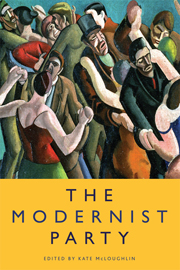Book contents
- Frontmatter
- Contents
- A Note of Thanks
- The Guest List
- Introduction: A Welcome from the Host
- 1 ‘The dinner was indeed quiet’: Domestic Parties in the Work of Joseph Conrad
- 2 Prufrock, Party-Goer: Tongue-Tied at Tea
- 3 Party Joyce: From the ‘Dead’ to When We ‘Wake’
- 4 ‘Looking at the party with you’: Pivotal Moments in Katherine Mansfield's Party Stories
- 5 Virginia Woolf's Idea of a Party
- 6 Proustian Peristalsis: Parties Before, During and After
- 7 ‘Ezra through the open door’: The Parties of Natalie Barney, Adrienne Monnier and Sylvia Beach as Lesbian Modernist Cultural Production
- 8 ‘Indeed everybody did come’: Parties, Publicity and Intimacy in Gertrude Stein's Plays
- 9 The Interracial Party of Modernist Primitivism and the Black ‘After-Party’
- 10 The Party In Extremis in D. H. Lawrence's Women in Love
- 11 Bohemian Retrospects: Ford Madox Ford, Post-War Memory and the Cabaret Theatre Club
- 12 ‘Pleasure too often repeated’: Aldous Huxley's Modernity
- Index
7 - ‘Ezra through the open door’: The Parties of Natalie Barney, Adrienne Monnier and Sylvia Beach as Lesbian Modernist Cultural Production
Published online by Cambridge University Press: 05 April 2014
- Frontmatter
- Contents
- A Note of Thanks
- The Guest List
- Introduction: A Welcome from the Host
- 1 ‘The dinner was indeed quiet’: Domestic Parties in the Work of Joseph Conrad
- 2 Prufrock, Party-Goer: Tongue-Tied at Tea
- 3 Party Joyce: From the ‘Dead’ to When We ‘Wake’
- 4 ‘Looking at the party with you’: Pivotal Moments in Katherine Mansfield's Party Stories
- 5 Virginia Woolf's Idea of a Party
- 6 Proustian Peristalsis: Parties Before, During and After
- 7 ‘Ezra through the open door’: The Parties of Natalie Barney, Adrienne Monnier and Sylvia Beach as Lesbian Modernist Cultural Production
- 8 ‘Indeed everybody did come’: Parties, Publicity and Intimacy in Gertrude Stein's Plays
- 9 The Interracial Party of Modernist Primitivism and the Black ‘After-Party’
- 10 The Party In Extremis in D. H. Lawrence's Women in Love
- 11 Bohemian Retrospects: Ford Madox Ford, Post-War Memory and the Cabaret Theatre Club
- 12 ‘Pleasure too often repeated’: Aldous Huxley's Modernity
- Index
Summary
In her discussion of the so-called ‘Lost Generation’ of the 1920s, Noel Riley Fitch cites F. Scott Fitzgerald's laconic description of the summer of 1925 as the summer of ‘1,000 parties and no work’. Yet the summer of 1925, as she rightly notes, occurs in ‘a year of great literary productivity’, which includes, among other things, the publication of Fitzgerald's own The Great Gatsby in the April and Virginia Woolf's Mrs Dalloway in the May. Contra to Fitzgerald's account of the division between party-going and literary production, this chapter will explore the extent to which the modernist party might be considered a site of intellectual work and literary productivity, as well as a place of levity and socialising. Moreover, it will suggest that, particularly where the cultural producers are rendered dissident by either their gender or their sexuality, the production of party space might be the necessary conduit by which they can make a cultural intervention. For the purpose of examining a phenomenon we might call the lesbian modernist party, this chapter will examine two such cultural interventions which took place in Paris during the years of intense modernist production: the Friday afternoon gatherings held by Natalie Barney at her pavillon in the rue Jacob and the radical use of bookshop spaces in the rue de l'Odéon for gatherings and readings by Adrienne Monnier and Sylvia Beach.
- Type
- Chapter
- Information
- The Modernist Party , pp. 127 - 146Publisher: Edinburgh University PressPrint publication year: 2013

